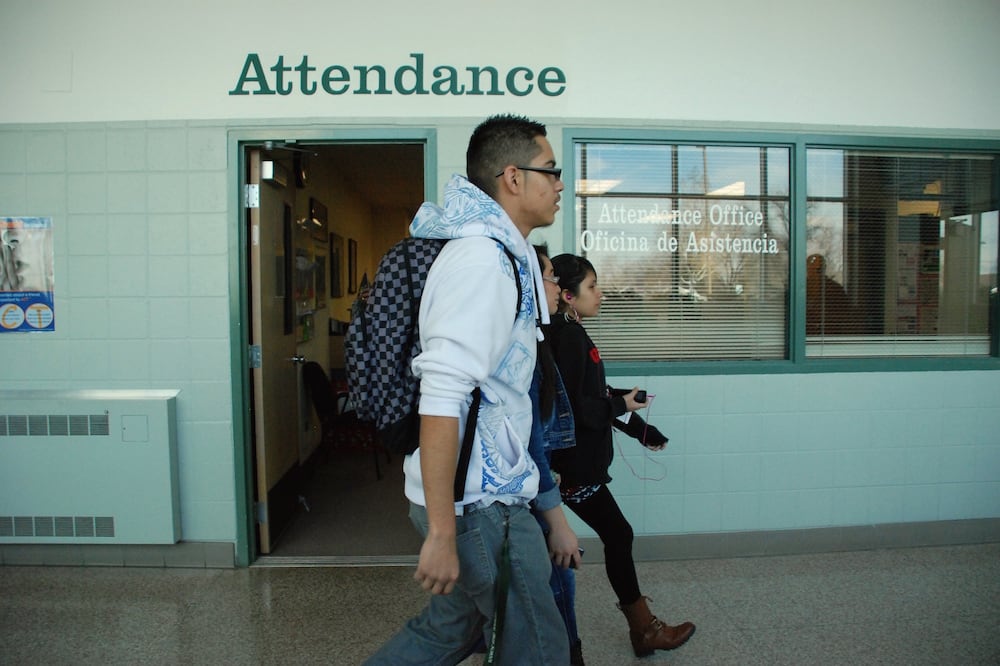Sign up for Chalkbeat Colorado’s free daily newsletter to keep up with education news in Denver and around the state.
Colorado State Board of Education voted Wednesday to allow two Aurora schools, North Middle School and Aurora Central High School, to continue their own improvement plans for another two years.
It’s a change for Aurora Central in particular, which before the start of the pandemic was facing more criticism and more possible intervention from the state.
On Wednesday, new district and school administrators told State Board members about the growth they’ve experienced and the changes they want to make to the plan.
The district’s plan for Central is to continue rolling out a K-12 arts program, further develop career and college options for students, and partner with a new group to help improve instruction. An analysis the district presented found that the school still has inconsistent teaching and planning.
For that reason, the district leaders said they looked for a new partner that could help drill down on improving instruction. They will partner with TNTP, a nonprofit education group that is also helping the Adams 14 school district, which is also under state-ordered improvement plans. Aurora leaders said they are using more specific goals in their work with TNTP as a result of a move towards outcomes-based contracts, in which the contractor’s pay can be tied to achieving certain goals.
North will have a new principal and will be working with a new management partner, switching from EdDirection, formerly known as MGT Consulting, to also work with TNTP.
North’s major focus will also be to improve teaching and leadership’s coaching abilities.
Two State Board members — Steve Durham and Deb Scheffel — voted against both plans. Durham criticized the education system as a whole and said Aurora Central’s plan seemed not to call for enough change.
Other State Board members said change takes time, noting that even though changes being made in Aurora might be incremental, there are reasons to be optimistic.
North Middle School is in its sixth year of low state performance ratings but was less than a point away from receiving a higher rating in 2023.
Aurora Central High School has had low ratings for more than 10 years. In its November 2019 hearing with the State Board, the school was given one year to start showing more significant improvements. But when the pandemic began, the testing and the state’s performance ratings were put on hold.
And in the most recent year, Aurora Central did not receive a rating because the district is transitioning the school into a K-12 campus. The elementary and middle school portions of the K-12 school are new and don’t have previous data to use in growth calculations.
Because of the insufficient data for a rating, Aurora Central was not yet required to face the state again. Still, the district asked for the hearing earlier than required, so the state-approved improvement plan better reflected the district’s work in the school.
State Board members said they appreciated the district being proactive in coming for a hearing before it was required to.
However, State Board members expressed concern with Aurora Central’s attendance rates, another issue identified by the district.
In the school year that just ended, Aurora Central had a 41% chronic absenteeism rate, higher than the state average of 31%.
School and district leaders said Aurora Central’s work under the community schools model is one of the ways they have tried to address attendance issues, by trying to have students and families connect to outside resources that might help.
In discussing both schools, State Board members also asked the school leaders about newcomer students. Aurora leaders said both schools have received high numbers of newly arrived immigrant students.
In Aurora Central, the school opened a newcomer center within the school in the 2020-21 school year and principal Kurtis Quig said students there are making good progress with the more intensive support.
The State Board orders will require each school to return for another hearing in front of the state after the 2026 performance ratings if they haven’t improved.
“I agree with my colleagues, this is going to be hard work,” said State Board member Angelika Schroeder. “I have the faith you’re going to do enough here to make progress.”
The Aurora district has also had a decline in its state rating this year. The district would have to face the state for its own state-ordered improvement plan if the low ratings persist for five years.
Yesenia Robles is a reporter for Chalkbeat Colorado covering K-12 school districts and multilingual education. Contact Yesenia at yrobles@chalkbeat.org.






